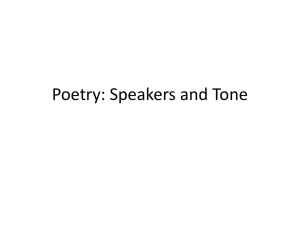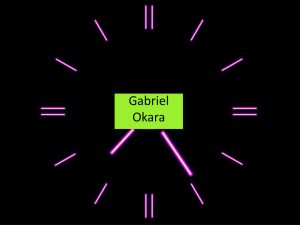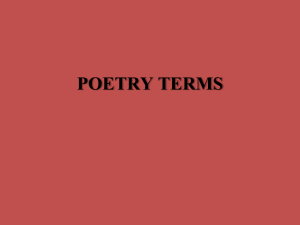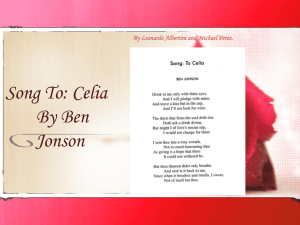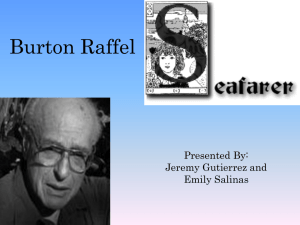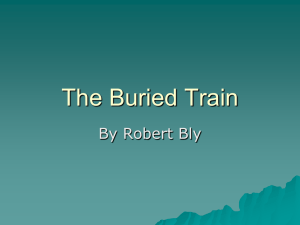ChurchGoing - WordPress.com
advertisement
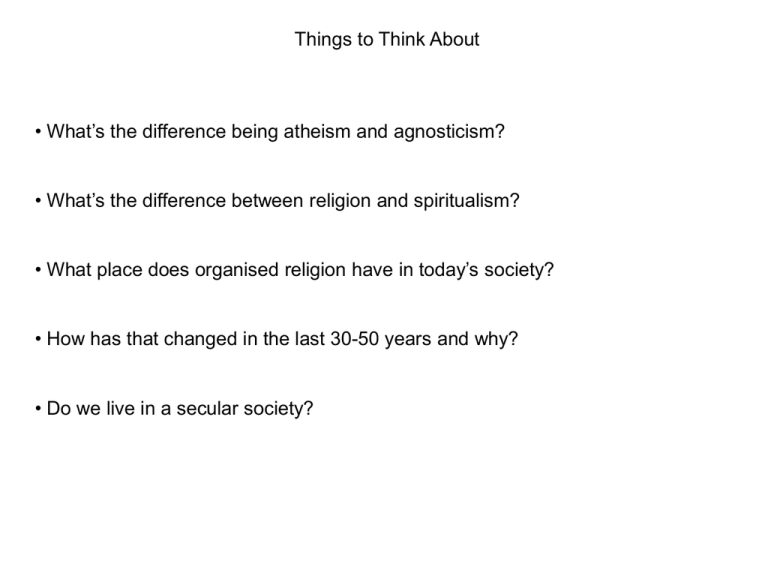
Things to Think About • What’s the difference being atheism and agnosticism? • What’s the difference between religion and spiritualism? • What place does organised religion have in today’s society? • How has that changed in the last 30-50 years and why? • Do we live in a secular society? Church Going Philip Larkin Larkin 1922-85. "Church Going" is one of his best-known, most admired poems. It first appeared in an anthology called New Lines (1956). Larkin and his contemporaries put the collection together. Together, they were known as the Movement, a group of poets who wanted to make their work relevant and accessible to everyday readers. As a group of young English writers they rejected the prevailing fashion for neo-Romantic writing in the style of Yeats and Dylan Thomas. Larkin focused on intense personal emotion but strictly avoided sentimentality or self-pity. Apart from his association with the Movement, Larkin is also often referred to as a "Postwar poet," meaning that his writing grapples with many of the big questions that people were forced to ask after living through the death and destruction of World War II. How could civilization be a good thing if it had led to such a terrible event? What higher purpose could people still believe in when the world seemed so horrible? This widespread questioning provided Larkin with a great opportunity to express his atheist beliefs and to ask really tough questions of traditional religion. He wasn't the first to do this, of course, and definitely won't be the last. But what makes many of Larkin's poems (and especially "Church Going") so enduring is the way he's willing to give religion its fair due, even as he criticises it. Rhyme, Form and Meter Despite the really conversational tone of the speaker, "Church Going" uses very a good deal of iambic pentameter and a regular rhyme scheme.There are five repeated pairs of syllables. Each pair begins with an unstressed syllable, followed by a stressed syllable. Reading this poem out loud should produce the following rhythm for each line: da-DUM da-DUM da-DUM da-DUM da-DUM. The poem (generally) follows the regular rhyme scheme of ABABCADCD. In this poem of nine-line stanzas, in each stanza the last word of lines 1,3 and 6 rhyme (A), the last words of lines 2 and 4 rhyme (B), the last words of lines 5 and 8 rhyme (C) and the last words of line 7 and 9 rhyme (D). HOWEVER on occasion Larkin plays with the formal iambic pentameter and rhyme. The speaker is appreciating the role of religion and the purpose it serves. By that token, the formal use of iambic pentameter seems appropriate to that solemn focus of the poem. BUT he’s never 100% convinced. He steps outside religion in order to critique it as a kind of superstition. FORM REFLECTS CONTENT. He also refuses to commit entirely to a solid, perfect end rhyme throughout (there are slants or near rhymes). He hesitates at points, which is totally in keeping with the hesitant approach that the speaker takes toward religion. This refusal to commit entirely to a rigid rhythm and rhyme goes a long way as well toward creating a really conversational tone in the poem. The organized form and meter of the poem represents the church, and the casual tone represents the speaker. Introduction to the first person speaker He’s clearly not comfortable being there if any formal religious activity is taking place. Once I am sure there’s nothing going on I step inside, letting the door thud shut. Another church: matting, seats and stone, And little books; sprawlings of flowers, cut For Sunday, brownish now; some brass and stuff Up at the hold end; the small neat organ; And a tense, musty, unignorable silence, ‘thud’ – onomatopoeia – dull, lifeless sound associated with speaker’s view of the church. Brewed God knows how long. Hatless, I take off My cycle-clips in awkward reverence Spondee – A foot. A stressed syllable followed by another stressed syllable. ‘thud shut’ – a spondee to emphasis the sound of the door closing. Adds to the creepy atmosphere the reader feels inside. Ignorant/ indifferent to supposed sacred objects. Nothing is meaningless, He does however, realise they should be. Once I am sure there’s nothing going on I step inside, letting the door thud shut. Another church: matting, seats and stone, Suggests all churches are the same/contain the same ‘stuff’ And little books; sprawlings of flowers, cut For Sunday, brownish now; some brass and stuff Up at the hold end; the small neat organ; ‘musty’ – And a tense, musty, unignorable silence, outdated and Brewed God knows how long. Hatless, I take off boring. BUT silence is My cycle-clips in awkward reverence ‘unignorable’ FIRST hint of the conflicting The hard enjambment of ‘cut’ linked emotions felt with word choice such as ‘brownish’ by the speaker. emphasis the sense of decay and harshness the speaker associates with the church. ‘Sprawlings’ – robs the church of any order/discipline it is suppose to have. Once I am sure there’s nothing going on I step inside, letting the door thud shut. Another church: matting, seats and stone, And little books; sprawlings of flowers, cut For Sunday, brownish now; some brass and stuff Up at the hold end; the small neat organ; And a tense, musty, unignorable silence, Brewed God knows how long. Hatless, I take off My cycle-clips in awkward reverence Humorous note. Duality of meaning. Growing belief in the importance of religion? OR mocking it – Empty, ridiculous custom? Metonymy – A technique when something is referred to by using something else that’s closely related to it. E.g The church = religion itself Move forward, run my hand around the font. From where I stand, the roof looks almost new – The speaker is more interested in the everyday rather than the spiritual significance Cleaned or restored? Someone would know: I don’t. Words connected to aging and the end. The speaker’s mindset is firmly that the end of organised religion is near. Mounting the lectern, I peruse a few Hectoring Large-scale verses, and pronounce ‘Here endeth’much more loudly than I’d meant. The echoes snigger briefly. Back at the door I sign the book, donate an Irish sixpence, Mirrors the central idea of the poem. Someone knows the significance of religion, but not him. Reflect the place was not worth stopping for. A worthless currency for something he believes worthless (organised religion) A change in tone between the 2nd and 3rd stanza. Atheism to Agnosticism. Yet stop I did: in fact I often do, And always end up much at a loss like this, Wondering what to look for; wondering, too, When churches will fall completely out of use What we shall turn them into, if we shall keep A few cathedrals chronically on show, Their parchment, plate and pyx in locked cases, And let the rest rent-free to rain and sheep. Shall we avoid them as unlucky places? What will become of the buildings when/if churches fall completely out of favour: - Museums? - Desolate/ramshackle barn? A reversal of the end of the previous stanza. He can’t answer the question about the significance of religion, but he’s beginning to consider the possibility that that doesn’t mean it is not significant. All that remains will be the natural world. There will be no sense of higher purpose. Whatever that might be. Or, after dark, will dubious women come To make their children touch a particular stone; Pick simples for a cancer; or on some Advised night see walking a dead one? Power of some sort will go on In games, in riddles, seemingly at random; But superstition, like belief must die, And what remains when disbelief has gone? Grass, weedy pavement, brambles, buttress, sky, If the things the sceptics disbelieve disappear e.g. religion and superstition disappear then the disbelievers will disappear too. Continues the idea from the previous stanza. A look into the future. - Links religion to superstition - Church becomes like the abandoned house in a horror movie. Dual meaning of ‘shape’ 1.The physical shape of the church disappearing 2.The shape/space religion occupies in our mind disappearing A shape less recognisable each week, A purpose more obscure. I wonder who. Will be the last, the very last, to seek The speaker is attempting to answer the question of what remains when organised religion and the church have disappeared from society. This place for what is was; one of the crew That tap and jot and know what rood lofts were? Some ruin-bibber, randy for antique, OR Christmas addict, counting on a whiff Of gown-and-bands and organ-pipes and myrrh? Or will he be my representative, Will they be like him? Dual reading. Silly and superficial or someone who, although they don’t understand the significance of churches, understands there might be some significance. All superficial associations/links with the church. No one who appreciates the spiritual questions that the church tries to provide answers for. Bored, uninformed, knowing the ghostly silt A future ‘him’ in a world where religion plays no part. Still bored and uninformed in the place, which now has no purpose. This also could be read as personal reflection on his current musings. Dispersed yet tending to this cross of ground Through suburb scrub because it held unsplit So long and equably what since is found Only in separation – marriage, and birth, And death, and thoughts of these – for which was built This special shell? For, though I’ve no idea What this accoutred frowsty barn is worth, It pleases me to stand in silence here; Duality of ‘ghostly’. Something dead or the ‘living’ holy ghost. Representative of the central question in the poem. Is religion dead or alive? Significant or irrelevant? ‘tending’ – suggests caring and draws religious importance to the place. ‘Suburbs’ – connotations of lack of emotional connection/avoiding neighbours. The fact that ‘scrub’ has to be fought through suggests worth holding onto importance of building/what it represents Bored, uninformed, knowing the ghostly silt Dispersed yet tending to this cross of ground Through suburb scrub because it held unspilt So long and equably what since is found Only in separation – marriage, and birth, And death, and thoughts of these – for which was built This special shell? For, though I’ve no idea What this accoutred frowsty barn is worth, It pleases me to stand in silence here; Suggestion that the church can make sense of death by giving significance to the end. BUT again the AMBIGUITY. ‘Shell’ has connotations of empty/lifeless, but this is juxtaposed with ‘special. The question mark signals the end of the speaker’s ‘representative’s’ musings. In a secular society (where the church has no significance) marriage often ends in divorce and births are not necessarily in ‘traditional’ family units. Bored, uninformed, knowing the ghostly silt Dispersed yet tending to this cross of ground Through suburb scrub because it held unsplit So long and equably what since is found Only in separation – marriage, and birth, And death, and thoughts of these – for which was built This special shell? For, though I’ve no idea What this accoutred frowsty barn is worth, It pleases me to stand in silence here; After all his musings he comes back to the idea that it holds no significance. ‘frowsty’ – musty, ‘barn’ – a space for storing animals etc, ‘accountred’ – furnished, but no significance to the objects. It is just a space of him, BUT it does make him happy. The speaker in the poem is really torn. On the one hand, he recognizes the importance of the work done by religion. But, on the other, he just can't bring himself to buy into that work fully. A serious house on serious earth it is, In whose blent air all our compulsions meet, The church is compared to a place where all human desires and drives blend together. Religion for the speaker is not just a set of rules or customs it’s an entire world view, which speaks to every corner of human life. Are recognized, and robed as destinies. And that much never can be obsolete, Since someone will forever be surprising A hunger in himself to be more serious, And gravitating with it to this ground, Which, he once heard, was proper to If only that so many dead lie round. As the final stanza begins, the speaker suggests that the reason he keeps coming back to the church is because it's so "serious." This seems to be a shift from the earlier vision of future churches as haunted houses. Superstition is not something usually taken seriously. Duality of meaning: 1. Church not only recognises human desires, but makes them to the entire grow seem wise significant in, universe by dressing them up or "robing" them "as destinies" It is giving purpose and structure to human experience. 2. Portrays this work as really superficial, too. The church "robe[s]" these feelings as destinies, which suggests that this is not truthfully what they are. Still, the speaker recognises that A serious house on serious earth it is, the church's power to make In whose blent air all our compulsions meet, human life meaningful will Are recognized, and robed as destinies. always be an important task. And that much never can be obsolete, Even though he's wondering about Since someone will forever be surprising what this church will look like A hunger in himself to be more serious, when all the believers have And gravitating with it to this ground, gone, he acknowledges Which, he once heard, was proper to grow wise in, that the work of the church in giving meaning to If only that so many dead lie round. life will never There will always be someone like the speaker who will feel a completely go "hunger in himself to be more serious" (60). It might not be away. everyone, but there will always be someone out there who looks for a deeper, more serious purpose to life. And the speaker recognises that religion can provide that. This desire for deeper meaning in the universe, the speaker concludes, will always make someone "gravitate" toward the holy ground of a church, even if this ground is only metaphorical, and not a physical place. The person will come to this place because he will find out what the church once stood for, that it was a "proper place to grow wise in" (62). But is there anything more to this claim than just hearsay? How do we know the church is a proper place to grow wise in? For the speaker, whether it's a superstition or the church has to be respected for the A serious house on serious earth not, it is, impact it has had on human history. For atheists, it's not as easy as saying, "Well for thousands of years, all of those people wasted In whose blent air all our compulsions meet, their lives on religious superstition." Rather, the poem in this moment suggests that, at the Are recognized, and robed asend destinies. of the day, people will always have a desire for finding a higher purpose in their And that much never can be obsolete, lives—even if that can't be something that is grasped with any degree of certainty. So, there must be some significance to the fact that so Since someone will forever be surprising many people over the millennia have satisfied this desire through religion. A hunger in himself to be more serious, And gravitating with it to this ground, Which, he once heard, was proper to grow wise in, If only that so many dead lie round. To answer that, the speaker says that the church grounds are meaningful because they're surrounded by dead people. He's saying that, even if there's not literally a God out there, there is still something to be said about this fact: for thousands of years, people have gone to their graves in the presence of a church—in other words, believing in God and heaven. The Speaker The speaker feels like church and faith might be declining in the modern world, and he's curious about what will happen to the church when the last of the believers are gone. While he doesn't come to any great conclusions, he figures that something of the church's influence will remain. He just doesn't know what. As a whole, the speaker in this poem is characterised by his tendency to ask questions. In fact, the poem is almost all questions between line 23 and 52. He doesn't seem to come up with many definitive answers, but that doesn't stop him from asking them in the first place. Setting Throughout the poem, the speaker focuses very closely on his setting. The irony and wit of the poem, however, comes from the fact that the speaker doesn't focus on any of the things he's supposed to when he's inside the church. Instead, he wonders about practical concerns like whether or not the roof's been cleaned or restored. Overall, the speaker's reactions to the setting of this poem (the church) symbolise the major theme of this poem, which is the gap between a person who's interested in religious faith and the deeper mystical meaning that only full-blown believers are familiar with. Setting up this relationship between the speaker and the setting shows us that the objects inside the church don't have any inherent meaning, but just the meaning that we give to them. But it also shows that the church does have a vague mystique that keeps the speaker coming back to check out the insides of churches. Ultimately, Larkin uses the tension between the speaker's ignorance of church symbolism, and his grasp on the physical church itself, as a staging ground for the tension between religious faith and secular skepticism. Eventually the speaker lands somewhere in the middle, in a place of questioning. Title "Church Going" seems like a very simple and straightforward title, just as the poem itself seems to be simple and straightforward. On the most literal level, it refers to the way that regular "church goers" attend mass every week. For the speaker of this poem, though, church going has a completely different set of meanings, because he's not connected to the official teachings of Christianity. Church going for him refers to the way that he continues to return to the church even though he can't find anything in it that's believable. This double meaning of "church going" helps to highlight the tension this poem explores between traditional religious meaning and the speaker's personal relationship to the church. On another level, "Church Going" could refer to the fact that the speaker of this poem spends much of his time wondering about what will happen to churches once people's belief in religion has vanished from the Earth. In other words, the title also hints at the possibility that the church might "go" away someday and never come back.
